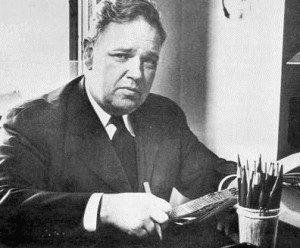 Every other year, I have the opportunity to teach a course I call “The Witness of Whittaker Chambers.” I’m teaching it again this semester. Chambers is not well known to most of our generation, but he was to an earlier one. Product of a dysfunctional family, devoid of any Christian upbringing, hit hard by life and seeking answers to the crises of the world after WWI, he turned to communism as the solution. Eventually, he became part of an underground cell that worked to place communists in key positions in the American government and pass secrets on to his master, Stalin.
Every other year, I have the opportunity to teach a course I call “The Witness of Whittaker Chambers.” I’m teaching it again this semester. Chambers is not well known to most of our generation, but he was to an earlier one. Product of a dysfunctional family, devoid of any Christian upbringing, hit hard by life and seeking answers to the crises of the world after WWI, he turned to communism as the solution. Eventually, he became part of an underground cell that worked to place communists in key positions in the American government and pass secrets on to his master, Stalin.
Chambers finally came to realize the horror he was supporting and broke away. He then had to come to grips with the God he never knew. When he made the conscious decision to turn to God, his worldview was revolutionized. In his bestselling autobiography, Witness, he explained what happened when the transformation took place:
What I had been fell from me like dirty rags. The rags that fell from me were not only Communism. What fell was the whole web of the materialist modern mind: the luminous shroud which it has spun about the spirit of man, paralyzing in the name of rationalism the instinct of his soul for God, denying in the name of knowledge the reality of the soul and its birthright in that mystery on which mere knowledge falters and shatters at every step.
He now saw things in a new light and realized the connection between the spiritual and the political:
External freedom is only an aspect of interior freedom. Political freedom, as the Western world has known it, is only a political reading of the Bible. Religion and freedom are indivisible. Without freedom the soul dies. Without the soul there is no justification for freedom. . . . Hence every sincere break with Communism is a religious experience.
His masterful autobiography is filled with memorable quotes. One of my favorites is this one:
There has never been a society or a nation without God. But history is cluttered with the wreckage of nations that became indifferent to God, and died.
Perhaps it’s time we heeded these wise words uttered more than sixty years ago. His insights are more apropos today than they were when they were written. Will we ever learn?
Chambers was not too optimistic about our society’s openness to the truth. In one of his essays in Time magazine, “Ghosts on the Roof,” he commented through the imagery of the Muse of History,
I never permit my foreknowledge to interfere with human folly, if only because I never expect human folly to learn much from history.
While I tend to agree, in the main, with that sentiment, I still hold out hope for a solid remnant who will cling to truth and make a difference in our culture. Those who know the One who is the Truth have both a deep responsibility for spreading the message and a reason for hope, not only in the next world, but also in this one. We need to be faithful to the task to which we have been called.
